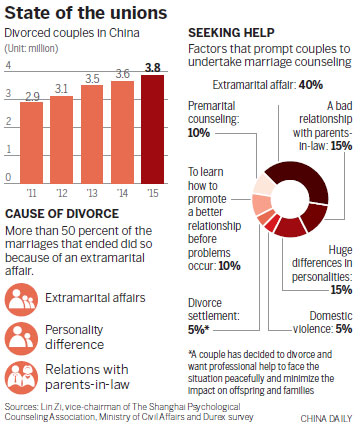
Marriage counselor Wang Wenjuan (far right) explains to clients how to properly handle the relationship between mother-in-laws and daughter-in-laws at a counseling service center affiliated with the local women's federation in Hefei, Anhui province in East China. (Xie Chen / For China Daily)
With divorce on the rise, marriage counselors say they are helping more couples find their way through troubled waters
In recent months, marriage guidance counselor Shi Xiuxiong has found his workload increasing to such an extent that he now foregoes the traditional lunch, opting instead for a quick sandwich in the face of a deluge of clients seeking professional help.
The founder of the Good Catch Love Counseling Work-shop in Shanghai, which specializes in providing assistance with relationship issues, is not alone. Many marriage counsel-ors have reported a noticeable rise in the number of couples approaching them for advice.
Figures from the Ministry of Civil Affairs show that last year, 3.84 million couples ended their relationships, a rise from 2.87 million in 2011.
The trend is most obvious in China's largest cities. Last year, the number of couples in Beijing untying the knot rose to nearly 56,000, from about 32,000 in 2010.In Shanghai, the figure peaked at 60,400 in 2013.
"Marriage counseling is relatively new in China. People only come to us when their marriages are on the verge of splitting up," said Shi, who founded the workshop in 2012. Counseling experts said extramarital affairs, personal differences and fractious relations with parents-in-law are the difficulties most frequently encountered by couples. Despite that, they said, the purpose of marriage counseling is not to salvage the relationship at all costs.
"As counselors, we stay neutral and open, and will never advise a couple to stay together or break up. That is a decision for them alone. Our role is to help them to see themselves and their most pressing needs more clearly, and to help them to figure out whether what they're doing is consistent with their ultimate goal," said Lin Zi, vice-chairman of the Shanghai Psychological Counseling Association and founder of a psychological consultancy that bears her name.
The neutral approach to marital and relationship advice is the one Shi, from the Good Catch Love Counseling Workshop in Shanghai, has also adopted: "We search for the best way for both members of a couple, and won't automatically assume that marriage is better than a divorce."
Generally, Shi's clients are aged 30 to 35, and have been married for less than five years. They are well-educated and highly-paid, and the ratio of women to men is 7-to-3. "The person who comes to us is usually the one who has identified that there is a problem and wants to save the relationship," he said.
For clients of counselors such as Shi, the guidance process usually involves three to eight sessions, each lasting one or two hours and costing about 800 yuan ($120) per hour.
"It's better if a couple attends together because it allows us to see clearly how they communicate with each other, figure out the problems and then fix them," Shi said.
He said he is always encouraged to see a couple having disputes and disagreements during counseling sessions because it shows that they still care about the relationship: "The biggest problems occur when one or both partners remain silent. That silence indicates that they hope I will advise them to give up."



















































